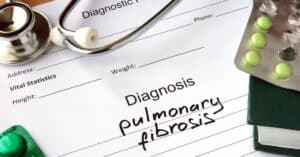Lung damage can be caused by various substances and conditions.
5 of the most common causes of lung damage include the following:
1. Smoking
The toxic substances in cigarette smoke can cause lung damage by triggering inflammation and destroying the elasticity and structure of the lungs’ air passages and air sacs. Additionally, cigarette smoke eliminates the lungs’ cilia (the structures responsible for clearing mucus), and the resulting mucus buildup can give rise to infection.
2. Household elements
Various materials found in some homes, including asbestos, bird protein, mold and radon, can lead to lung damage.
3. Pollution
Consistently inhaling air pollutants can cause lung inflammation, which may eventually result in lung damage.
4. Medical conditions
Certain medical conditions may cause lung damage, including:
- alpha-1 antitrypsin deficiency
- lupus
- mixed-connective tissue disease
- polymyositis/dermatomyositis
- pulmonary vasculitis
- rheumatoid arthritis
- sarcoidosis, scleroderma
- Sjogren’s syndrome
- Undifferentiated connective tissue disease
Additionally, people who have close relatives who were diagnosed with emphysema have an elevated risk of developing emphysema themselves given their similar genetic characteristics.
5. Medical treatments
Treatments for certain medical conditions can cause lung damage. For instance, chemotherapy (particularly cyclophosphamide and methotrexate) and radiation therapy (especially that for lung or breast cancer) may lead to lung damage.
Certain antibiotics (including nitrofurantoin and sulfasalazine), anticonvulsants, antiarrhythmics and heart medications (including amiodarone and propranolol) can also lead to lung damage.
In some cases, the cause of lung damage is unknown.
In fact, there is an entire set of lung diseases (encompassing approximately 100 different pulmonary disorders) that exists for which there is sometimes no apparent cause. This grouping is categorically referred to as idiopathic lung disease.
Some lung conditions that can be classified as idiopathic include pulmonary fibrosis, cryptogenic organizing pneumonia and sarcoidosis.

Christine Kingsley, APRN is the Health and Wellness Director at the Lung Institute where she focuses on providing helpful online resources for people looking for information on various lung diseases, breathing exercises, and healthy lifestyle choices. She advocates for holistic care that involves working with your doctor to explore all options including traditional and alternative care while focusing on diet and exercise as proactive measures.









